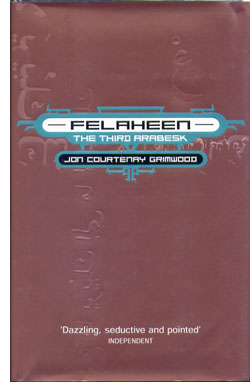Felaheen
Jon Courtenay Grimwood
Earthlight / Simon & Schuster
UK Hardcover First
ISBN 0-743-46117-7
Publication Date: 05-01-2003
357 Pages; £12.99
Date Reviewed: 05-28-03
Reviewed by: Rick Kleffel © 2003

REFERENCES
COLUMNS
|
|
|
FelaheenJon Courtenay GrimwoodEarthlight / Simon & SchusterUK Hardcover FirstISBN 0-743-46117-7Publication Date: 05-01-2003357 Pages; £12.99Date Reviewed: 05-28-03Reviewed by: Rick Kleffel © 2003 |
|
|
REFERENCES |
COLUMNS |
In most books language is used to build characters. In Jon Courtenay Grimwood's 'Arabesks', language for all intents and purposes is a character. 'Felaheen' continues the story of Ashraf Bey and his niece, Hani in a world that is so original it reads like the densest space operas, though it never leaves solid ground. Grimwood bathes the reader in the language of an intensely Islamic and Middle Eastern world that is so sensual, you'll dump the sand from your shoes after finishing a chapter. At turns impenetrable, then as crystal clear as the water in an oasis, 'Felaheen' is another brick in a wall that will either surround readers in a wonderfully conceived world or keep them out more efficiently than translation to a dead language. If you've read the first two novels in this series, then you'll no doubt look forward to another vacation with Ashraf; if not, give the first, 'Pashazade', then the second 'Effendi' a try. This is beautifully written and utterly unique fiction. There's nobody else writing anything remotely like these books. What's more, nobody else could write anything remotely like these books. Jon Courtenay Grimwood is a true original. I hope that in between novels, his publisher puts him on a shelf with the other national treasures.
Writing books as dense as the Arabesks is a definite invitation to those who like to read and re-read their books. Had I time, I'd go back and re-read both 'Pashazade' and 'Effendi' just to enjoy the effect of Grimwood's lush prose. But I didn't, so I just plunged in to Grimwood's latest lush extravaganza. Extravagant is a key word here; Grimwood goes overboard with the Islamic and Arabic neologisms and idioms, immersing the reader in his created world with so much detail that they are at risk of losing track where they might actually be sitting while they read the books. This time around, Ashraf is once again searching for evidence of who his father truly might be while trying to determine if someone is trying to kill the man who might be his father, the Emir. Interspersed with the main narrative are flashbacks of a nasrani eco-terrorist's journey into Ifriqiya's heart to find and bed the man of her dreams. Grimwood carefully keeps the reader guessing the connection until an electric wire sizzles and the reader's brain lights up like Roman candle. This happens frequently in this novel; it's one of the great pleasures of Grimwood's work.
While Grimwood's alternate history is still largely obscure, more parts of it slot into place with each passing novel. His world is so densely created that it has the grit and grain of truth. Readers will be pleased to learn much, much more about Ashraf than they have as yet. It's remarkable that Grimwood can keep revealing so much of the character to readers in each work, yet leave so much to discover. With a world that's extremely foreign and language that's peppered with so many unusual words that Grimwood must turn off his auto-speller unless he wants to see pages of underlined red, Grimwood keeps his characters extremely appealing. Ashraf Bey is truly a man of mysteries, to himself as well as the reader. The journey of discovery is pleasant and exciting. Hani is just the prototypical smart kid in funny clothing and gorgeous, elegant language. In a more mundane setting, she might be an annoyance; here she's a delight.
Readers who loved Lawrence Durrell should run, not walk to buy these novels and prepare for the time of their lives. Likewise, those who enjoyed the late George Alec Effinger's novels of Marid Audran will find these novels familiarly foreign. Those who enjoyed the desert settings and stylings of Frank Herbert's 'Dune' novels will also find Grimwood's Arabesks a revelation. While the novels are nominally described as mysteries - and the cleverly revealed plots have the prerequisite murders, hidden identities and double-crosses - their feel is more that of a travelogue. If you enjoy reading as a luxury, as a lush and sensuous experience, then Grimwood will give you more than you bargained for. Grimwood's writing is so seamless it's impossible to tell where the Islamic imports leave off into the invented history or the science fiction. It's all one weave, whole cloth. If you've read the first two novels, this book is not surprisingly just as good and just as weird. Grimwood is a very strange writer who is doing something only barely comprehensible, but he does it so remarkably well that no reader can fail to recognize the presence of great talent - and great fun.